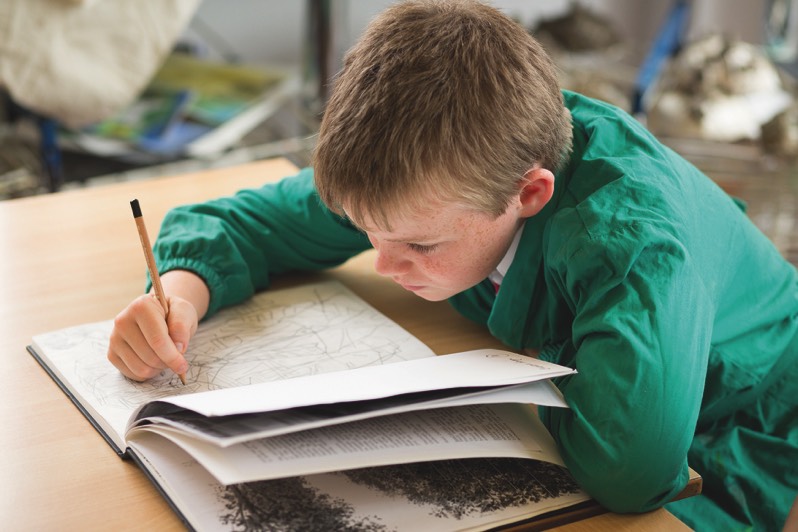EDUCATION
Surrey’s Premier Lifestyle Magazine
Greater expectations
Michael Connolly, Headmaster of Cranmore School, discusses the influence of school inspections.

There have been some notable milestones over several decades in which politicians have made decisions that turned out to have a long-term influence on educational policy and practice.
The ‘Butler Act’ in 1944 aimed to provide a vision of how education might evolve in post war Britain. This included a tripartite system of secondary education which was never fully implemented. However, it also contained some pragmatic initiatives such as the provision of ‘school dinners’ and free milk, the latter famously withdrawn by Margaret Thatcher.
Just over thirty years later, in 1976, Prime Minister James Callaghan gave a landmark speech at Ruskin College, Oxford. In one sense, it was a direct challenge to the custom and practice that teachers should be left to decide what children should learn and how they should be taught. At the heart of this debate was the concept that the provision of high quality education would enrich the lives of children and, in due course, have a beneficial effect on the economy with a much better educated and skilled workforce.
Not surprisingly, this led to a discussion about how to measure educational standards and, of equal importance, the need for consistency in all parts of the nation. The logical outcome was to ensure that there was a robust inspectorate which, inter alia, would become an enforcer of these new standards. The creation of Ofsted in 1984 was a statement of intent for the educational new world order.
The ‘Butler Act’ in 1944 aimed to provide a vision of how education might evolve in post war Britain. This included a tripartite system of secondary education which was never fully implemented. However, it also contained some pragmatic initiatives such as the provision of ‘school dinners’ and free milk, the latter famously withdrawn by Margaret Thatcher.
Just over thirty years later, in 1976, Prime Minister James Callaghan gave a landmark speech at Ruskin College, Oxford. In one sense, it was a direct challenge to the custom and practice that teachers should be left to decide what children should learn and how they should be taught. At the heart of this debate was the concept that the provision of high quality education would enrich the lives of children and, in due course, have a beneficial effect on the economy with a much better educated and skilled workforce.
Not surprisingly, this led to a discussion about how to measure educational standards and, of equal importance, the need for consistency in all parts of the nation. The logical outcome was to ensure that there was a robust inspectorate which, inter alia, would become an enforcer of these new standards. The creation of Ofsted in 1984 was a statement of intent for the educational new world order.
Of course, the drive to improve educational standards could not happen overnight. It was not until 1988 that Kenneth Baker, as Secretary of State for Education, introduced a National Curriculum which set out in precise terms what children should be taught up and down the land. He is also remembered for introducing statutory training days for teachers, so called Baker Days, recognising that some staff had taught for decades after their PGCE without any significant upgrade in their skills or knowledge. It has been a bumpy ride for teachers ever since with an endless stream of changes to standardised tests (SATs) as well as public exams such as GCSE, AS and A-level. There has been a push to adopt new practices, particularly with regard to information technology, to equip young people for living in a digital age. Whilst teachers have generally coped quite well with the rapid pace of change, their bête noir continues to be the thorny problem of school inspections.
One can understand their misgiving when one reads what the Chief Inspector, Sir Michael Wilshaw, stated when interviewed by the Times Educational Supplement last month: “We have got to challenge complacency, we have got to challenge mediocrity and we have got to challenge failure where we see it. And if Ofsted doesn’t do that, who is going to?” As blunt as it may sound, fundamentally he is correct, although it might be construed as implying that inspectors are actively seeking ways to detect failure.
One can understand their misgiving when one reads what the Chief Inspector, Sir Michael Wilshaw, stated when interviewed by the Times Educational Supplement last month: “We have got to challenge complacency, we have got to challenge mediocrity and we have got to challenge failure where we see it. And if Ofsted doesn’t do that, who is going to?” As blunt as it may sound, fundamentally he is correct, although it might be construed as implying that inspectors are actively seeking ways to detect failure.

There is an answer to his rhetorical question, if not Ofsted, then who? Independent schools have their own inspection framework under the auspices of the Independent Schools Inspectorate (ISI). In the main, inspections are carried out by teams which consist mostly of serving head teachers. If nothing else, this ensures that those who are making the evaluations are involved in running schools themselves and have a natural empathy for the challenges this entails. The criteria are sufficiently robust and cover compliance with all manner of regulatory requirements as well as looking at pupils’ achievements and personal development.
As a headmaster myself, I must admit I hardly relish the prospect of the dreaded phone call to tell me that an inspection team will be descending upon my school within twenty-four hours. Nevertheless, I have always valued the endorsement of the subsequent inspection report confirming what an outstanding job my colleagues do day after day. Yes, I have also been an inspector for many years and so have the opportunity to see other schools in action. In my view, it’s a good thing to put ourselves under the spotlight of fellow professionals so we can identify our strengths and aspects for development. For our most recent inspection, we were graded excellent in every single category, a plaudit which we shall work hard to maintain.
As a headmaster myself, I must admit I hardly relish the prospect of the dreaded phone call to tell me that an inspection team will be descending upon my school within twenty-four hours. Nevertheless, I have always valued the endorsement of the subsequent inspection report confirming what an outstanding job my colleagues do day after day. Yes, I have also been an inspector for many years and so have the opportunity to see other schools in action. In my view, it’s a good thing to put ourselves under the spotlight of fellow professionals so we can identify our strengths and aspects for development. For our most recent inspection, we were graded excellent in every single category, a plaudit which we shall work hard to maintain.
essence info
Cranmore School has embarked on a programme of change progressing to full co-education for pupils aged two and a half to thirteen years. Children study the standard subjects as well as a stimulating curriculum including French, Mandarin, Spanish, Latin, Greek and a wide selection of extra-curricular activities. The excellent facilities include a golf course, swimming pool, fitness suite and also a Forest School so that the youngest pupils from the nursery onwards can experience real ‘outdoors education’.Telephone: 01483 280340
Website: www.cranmoreprep.co.uk



